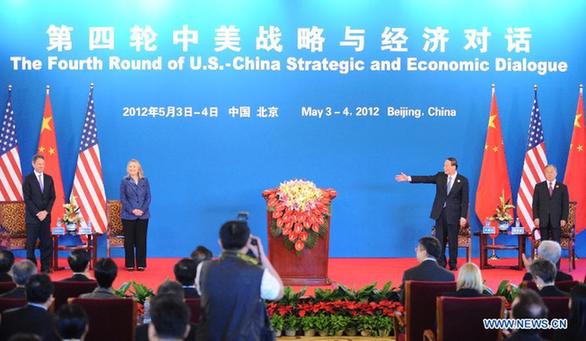Listening as well as talking
 0 Comment(s)
0 Comment(s) Print
Print E-mail China Daily, May 4, 2012
E-mail China Daily, May 4, 2012
The same day that Vice-Premier Li Keqiang wrapped up his European trip, which came close on the heels of Premier Wen Jiabao's own European trip, the fourth round of the China-US Strategic and Economic Dialogue started on Thursday in Beijing.
|
|
|
The fourth round of the China-U.S. Strategic and Economic Dialogue is opened in Beijing, capital of China, May 3, 2012. [Xinhua] |
Economic and trade concerns stand tall in most of these face-to-face communications. This is logical at a time when Europe is still struggling to overcome its debilitating debt crisis, and China and the United States share an urge to iron out their differences over interest rates, intellectual property rights, export restrictions and investment policies.
However strategic concerns are also on the agenda. The stakes are high considering the size of the three economies, so direct exchanges at the highest possible levels are essential to avoid misunderstandings and hence misjudgments. This is something they have learnt the hard way.
That they have, by and large, included in bilateral consultations all major topics of concern, from human rights to currency policies, testifies to an ever-clearer consensus that dialogue is the best means of dealing with their differences.
There have been many ups and downs in the relations between China and Europe and the US over the past decades, but immediate benefits have served to anchor bilateral ties. Yet it is this shortsighted focus on short-term goals that causes the instability in the ties. The increasing dialogue that is taking place may add a valuable long-sighted strategic perspective to the handling of such relationships.
Beijing's eagerness to exploit the constructive potential of its dialogues with the US and Europe is both explicit and sincere. Throughout their visits to Europe, Wen and Li appealed for a more open Europe while assuring their hosts of China's commitment to the special partnership. Addressing the China-US dialogue in Beijing, President Hu Jintao emphasized the need for equality and mutual understanding for a "new type of relations" between the two countries. But such words will only work when embraced by both parties.
The practical approaches of Europe and the US to the relations with China are sadly lacking in strategic insight.
The apparent vulnerability of the ties to what should be manageable incidents, indicates the conspicuous obsolete thinking that shapes the policies of Europe and the US.
If they are truly interested in better ties with China, they need to be more attentive to China's concerns: that is not dancing to China's tune, it is reciprocal respect.






